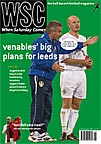 Paul Hutton reflects on a sordid affair north of the border
Paul Hutton reflects on a sordid affair north of the border
It’s enough to make even Marti Pellow weep – on July 9 Clydebank, the club whose shirts were once sponsored by Wet Wet Wet, ceased to exist as a Scottish League club. Having survived more traumas in the last few years than anyone deserves, Clydebank were finally sold by the administrators to a Glasgow-based accountant and Airdrie fan, Jim Ballantyne. They will play next season’s fixtures as tenants in the ground left vacant by Airdrie’s liquidation, in Airdrie’s colours, under the name Airdrie United.
Nobody comes out of this saga well, with the exception of Clydebank’s fans. Their current troubles began in 1996 when the club’s owners, the Steedman family, sold Kilbowie Park without having obtained planning permission for a new ground. The plan at the time was to share with nearby Dumbarton until a new ground was built in Clydebank, but when permission for this was refused, the club was sold to expatriate businessman John Hall, and it’s been downhill ever since.
The intervening five years have seen those running the club propose relocation in Dublin and Carlisle, while making no progress towards bringing them back to Clydebank. In fact, for the last two years they have been playing their home games in Greenock, a 50-mile round trip on the other side of the Clyde with no direct public transport link. Not surprisingly, having been buggered about to this degree, their support has dwindled.
Ironically, they may have been close to a fairer solution. With the club still in administration, and a preferred bidder for the business withdrawing their interest late last season, the fans decided they couldn’t wait to be saved. United Clydebank Supporters, formed five years ago, proposed a deal over the close season that would have saved the club and see it return to Clydebank. In essence they believed they had the agreement of the owner John Hall and PKF, the chartered accountants acting as administrators, for a supporters’ trust to buy the club for £160,000 at the end of next season. But then came the Airdrie bombshell.
When Airdrie lost their League membership in May, their preferred method of bringing football back to the town was for a new club, Airdrie United, to apply to join the League in the Third Division. When the remaining League clubs voted in June, Airdrie United lost out Gretna. (While Gretna winning may have been a surprise, Airdrie losing wasn’t – it was, after all, a bid which came from a club that existed only on paper.) With that door closed, they looked for other options, and spotted Clydebank.
The first offer was a merger, with the new club playing in Airdrie and being called Airdrie United. Not surprisingly, this idea was rejected. So then a bid was made to the administrators to buy Clydebank and move it, franchise style, to Airdrie – a proposal that would have to be approved by the League’s Management Committee. On July 1, they decided that there was no likelihood of the club ever making it back to Clydebank and concluded that an individual buying the club could pretty much take it where they wanted and call it what they liked.
In a final twist, the administrator gave the supporters a chance to come up with the cash. Having planned to raise the money over the course of a year, UCS managed to raise it in a week, only for Airdrie United’s backers to outbid them. After 36 years, Clydebank had gone.
There is no doubt that more people will watch Airdrie United next year than would have watched Clydebank. But is that the point? UCS believed they had a proposal to save the club backed by the administrators and the League, and were stiffed by both. While the League stuck by their rules all through this saga, they have now created a situation where a club heavily in debt can enter liquidation, then buy a struggling club (and there are enough of those about) to re-enter the league pretty much debt free. In the absence of a pyramid system allowing entry to the League, Airdrie’s backers may feel they had no other option, but their actions are simply the least pleasant part of a very sorry mess.
From WSC 187 September 2002. What was happening this month